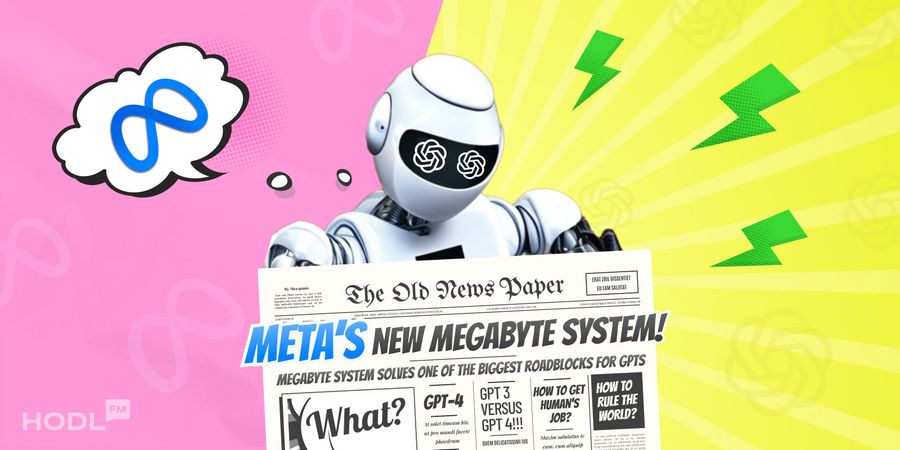Humankind has been fascinated by Artificial Intelligence since the mid-1900s. The concept of intelligent machines can be traced further, with early ideas and theories emerging in the 1940s and earlier. Over the decades, AI has undergone significant advancements, propelled by technological breakthroughs, innovative research, and increasing computational power. Although we still have to wait for J.A.R.V.I.S. (Iron Man) type of AI to become mainstream, there is no denying the AI boom similar to the crypto boom that took the world by storm a couple of years ago. What a time to be alive!
Now let’s go back to the real world. In the realm of AI, Generative Pre-trained Transformers (GPTs) have captivated the world with their extraordinary ability to understand and generate human-like text. But there are some challenges along the way. With the idea of making AI closer to perfect, Meta AI has unveiled its groundbreaking Megabyte System—an ingenious solution that not only overcomes these roadblocks but also opens up new realms of possibilities.
Now that we laid the groundwork, get ready to uncover their mind-boggling potential and prepare to be utterly dazzled by the mind-blowing powers of Meta’s Megabyte System!
Recent news: Meta to End NFT Initiatives on Facebook and Instagram
Language Generation at Its Finest
What does GPT stand for? “Generative Pre-trained Transformers” (GPTs) are a technological marvel that brings us closer to the realm of human-like language generation. These powerful language models harness the power of deep learning and transformer architectures to process and understand vast amounts of text data. GPTs are trained on diverse sources such as books, articles, and websites, enabling them to learn the nuances of language and context. Through pre-training, GPTs acquire a comprehensive understanding of grammar, vocabulary, and even subtle nuances of tone and style. This is how ChatGPT for example, can write poems that make us giggle and fascinate at the same time.
GPTs offer a wide array of possibilities in natural language processing and AI applications. They can generate coherent and contextually relevant responses, making them invaluable in conversational agents, chatbots, and virtual assistants. Furthermore, GPTs have proven their mettle in creative writing, composing poetry, and even writing code. Their versatility and adaptability make them a powerful tool for various industries and domains. On the right hand, such systems are capable of greater things than predicting the next Eurovision or World Cup winner.

The Challenges of GPTs
While GPTs exhibit exceptional language generation capabilities, they do face certain limitations. One significant hurdle is the tokenization problem. Let’s understand why.
GPT models process data by breaking it down into smaller units called tokens. These are different from the idea of a “token” that might be on a hodler’s mind. These tokens allow the models to handle and process text effectively. However, this process comes with constraints. For instance, GPT-3.5 can handle around 4,000 tokens, equivalent to approximately 3,000 words, while GPT-4 expands the limit to 32,000 tokens or about 24,000 words. These limitations pose challenges when working with longer texts or processing large volumes of data.
Another challenge is the computational requirements and storage capacity associated with large-scale GPT models. Training and fine-tuning these models demand significant computational resources, making them inaccessible for many individuals and organizations. Additionally, the storage requirements for GPT models are substantial, posing logistical challenges for deployment and usage in resource-constrained environments.

Meta’s Megabyte System Addresses the Roadblocks
Meta AI’s Megabyte System—a game-changing solution that addresses the roadblocks faced by GPTs. The Megabyte System introduces a revolutionary approach by bidding farewell to tokenization, the limiting data processing model used by other GPTs.
By leveraging a new multi-layer prediction architecture, the Megabyte System empowers GPTs to model and process over 1 million bytes of data, surpassing the previous limitations of token-based processing.
The magic behind the Megabyte System lies in its innovative approach to compression algorithms, parameter sharing, and other strategies. These techniques reduce the size and resource requirements of GPTs, resulting in improved scalability, reduced resource consumption, and enhanced accessibility to GPT-based applications. With the Megabyte System, GPTs can process an astounding amount of untokenized data. This means an AI model can effortlessly handle text documents containing 750,000 words, representing a staggering 3,025% increase compared to the limits of GPT-4.
Unlocking New Realms: Language Diversity, Literary Masterpieces, and Multimedia Creativity
The impact and implications of Meta’s Megabyte System stretch far beyond language processing. By eliminating tokenization, this innovative solution strengthens the foundation for non-English languages, which may not easily conform to standard character encoding schemes. This breakthrough brings us closer to the democratization of AI technologies, allowing developers worldwide to build cryptocurrency trading bots and decentralized autonomous organization technologies in their native languages. It promotes inclusivity and expands opportunities for individuals and communities who communicate primarily in languages other than English.
The Megabyte System’s ability to handle multimedia files propels us into a new era of creativity. AI models like ChatGPT can now effortlessly generate multimedia content—images, videos, and audio—with similar time and energy consumption as text. Imagine the possibilities! From AI-generated short films that rival the works of acclaimed directors to interactive presentations that seamlessly integrate visual and auditory elements, the Megabyte System opens up a world of immersive experiences.
To illustrate the power of the Megabyte System, let’s consider a classic literary masterpiece—Leo Tolstoy’s War and Peace. This epic novel spans over 560,000 words, making it a monumental challenge for traditional GPT models. However, with Meta’s Megabyte System, GPTs can now process and analyze the entirety of War and Peace effortlessly. This newfound capability expands the realm of text-based analysis and understanding, allowing AI models to delve into complex narratives, characters, and themes present in such colossal works. But this shouldn’t make us lazy as masterpieces like War and Peace, Crime and Punishment, Moby Dick, and others will be worth reading throughout the ages. These highly recommended reads right there! Megabyte System and other GPTs will be amazing research tools nonetheless.
But it doesn’t stop at literature. The Megabyte System enables GPT models to handle large-scale multimedia projects with finesse. ChatGPT, armed with the Megabyte System, can generate dynamic video clips, combining images, videos, and audio to create engaging multimedia presentations. Whether it’s producing captivating advertisements, generating personalized video messages, or even creating virtual experiences with rich visual and auditory elements, the Megabyte System unlocks a universe of creative possibilities.
How Does Megabyte System Work?
This is a bit technical, so buckle up! But don’t worry, we’ll provide you with a simplified explanation too.
At its core, the Megabyte system is a multiscale decoder architecture that can model sequences comprising over one million bytes with end-to-end differentiability. The byte sequences are divided into fixed-sized patches, which are analogous to tokens. The Megabyte model consists of three main components: the patch embedder, the global module, and the local module.
The patch embedder takes a discrete sequence as input, embeds each element, and divides it into patches of a fixed length. The global module is a large autoregressive transformer that contextualizes the patch representations by performing self-attention over previous patches. On the other hand, the local module is a small transformer that takes a contextualized patch representation from the global model and autoregressively predicts the next patch.
One of the key concepts used in the Megabyte system is multiscale transformers. These transformers incorporate multiple levels or scales of representation within their architecture. By capturing information at different granularities or resolutions, multiscale transformers effectively model both local and global patterns in the data. In the case of Megabyte, transformers with different receptive fields are stacked together, allowing the model to leverage information at multiple scales.
Autoregressive transformers, a variant of the transformer architecture, play a vital role in the Megabyte system. These transformers are specifically designed for sequence modeling tasks and are widely used in natural language processing. Autoregressive transformers are trained on language modeling tasks, where the objective is to predict the next token in a sequence based on the previous tokens. They employ a self-attention mechanism to capture dependencies between different positions in a sequence, enabling them to generate coherent and contextually relevant sequences of text.
As mentioned before, the Megabyte system addresses several issues associated with current models. One such issue is tokenization, where sequences need to be tokenized before processing. This process adds complexity to pre-processing, multi-modal modeling, and transfer to new domains. The Megabyte system eliminates the need for tokenization, simplifying the overall process.
Scalability is another challenge faced by current models, as the self-attention mechanism scales quadratically with the sequence length. Megabyte overcomes this limitation by dividing long sequences into two shorter sequences, reducing the self-attention cost to a more manageable level.
In terms of generation speed, current GPT models predict each token one at a time, resulting in slower text generation, especially in real-time applications like chatbots. The Megabyte system introduces greater parallelism during sequence generation by generating sequences for patches in parallel. This parallel processing allows Megabyte to generate sequences faster compared to conventional transformer models.
How Does Megabyte System Work? – Simplified version
For dummies, the Megabyte system is a powerful computer program that excels at working with words and sentences. It has the amazing ability to handle large amounts of text, like books or articles with many, many words. But it doesn’t stop there! The Megabyte system can also process other forms of information like pictures, videos, and sounds. It does this by breaking down the words or bytes into smaller parts and carefully analyzing the patterns they create.
It has different parts of its “brain” that work together to understand the overall meaning and predict what might come next. This makes it really fast at generating new text and helps it work with different languages. With the Megabyte system, we can do all sorts of cool things like translating languages, summarizing long pieces of writing, and even analyzing huge books all at once. It’s like having a super-intelligent friend who can assist us with a wide range of language-related tasks!

Conclusion
We reach the end of our exhilarating journey through the realm of GPTs and the awe-inspiring Megabyte System. As we close this chapter, we can’t help but marvel at the ingenuity and sheer audacity of Meta AI. They have vanquished the roadblocks that plagued their predecessors and brought forth a system that defies the conventional limits of AI. With stronger language support, the ability to conjure multimedia wonders, and a global community of developers at their disposal, the Megabyte System stands tall as a beacon of innovation.
The smarter the AI, the more exciting the future is. Until they become conscious and rebel against humans of course. But this is a story that we really rather not think about.



